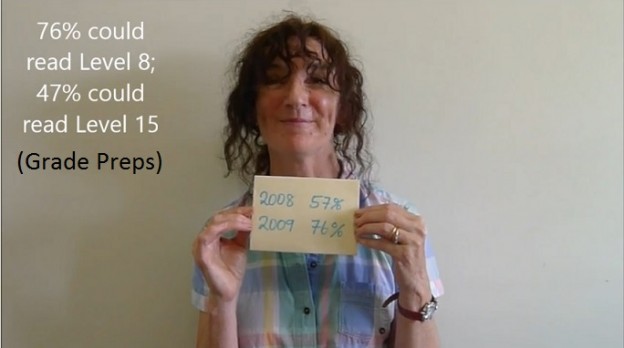One teacher’s early literacy epiphany
6 Replies
I recently met an experienced Melbourne primary teacher, Berys Dixon, who told me the delightful story of how she came to be an advocate of explicit, systematic, synthetic phonics.
Returning to work after raising her family, she was instructed to use a multiple-cues, guided reading approach with her class of five-year-olds. Many spoke a language other than English at home, and the school was in a low socioeconomic area.
One day, a parent complained that her child couldn’t sound out the words in his home reader. Berys advised the parent not to expect the child to sound out, but to encourage him to look at the picture, read ahead, have a guess etc. Then if he still couldn’t get the word, just read it for him.
Berys realised that what she had just said made no sense. She went home and started googling.
Rather than me paraphrasing the rest of Berys’s lovely story, which has a very happy ending, please take five minutes to listen to her telling it herself.
Because we’re all humans, we tend to understand and believe the personal stories other people tell us more than we understand and believe data and graphs.
I hope that Berys’s story (which is consistent with the very best data and graphs) will help persuade teachers of beginners and young strugglers to include explicit, systematic synthetic phonics in their literacy curriculum.
If her super-affordable and funny Pocket Rockets make that more possible, great. Each child’s set can be stored in a little photo album from the $2 shop, making them durable yet very small and lightweight for young children’s (often heavy and full) school bags.
The teaching sequence these booklets follow is from the UK government’s Letters And Sounds program. There are many free teaching resources for this program available online, click here, here and here for examples. Or just start googling, like Berys!
Update April 2019: Berys now has a website and her books are available in larger size and parent packs. I’ve also made a free downloadable beginners’ workbook following the same teaching sequence as her books, which you can print and use with the first set of her books (phase 2, the orange ones).



Berys's success was exactly as described – I know because I was a work colleague at the time, and witnessed her drive and determination to help her students' achieve early Literacy success. The results she described were independently verified. Berys continues to inspire, assist and encourage teachers in this research-driven, systematic and effective process of learning to read and write.
Thanks for your lovely comments Wendy, but I couldn't have done it without your inspiring leadership as junior Literacy Co-ordinator. I'd like to make the point that no school can improve its literacy program without the strong backing, encouragement and expert knowledge of of its literacy leaders..
[…] Thanks Spelfabet for this clear article and video clip. Author of Pocket Rockets tells how she had an epiphany and realised that she could change the lives of her pupils by adopting systematic synthetic phonics. Then she developed her own decodable booklets once she realised that the reading materials given to beginner readers developed guessing not decoding. http://www.spelfabet.com.au/2015/03/one-teachers-early-literacy-epiphany/ […]
[…] One teacher’s early literacy epiphany | Spelfabet. […]
Hi, My name is Britney. I am one of berys’ old student. I would like to meet her with a group of friends that she also taught, but i can’t seem to find a way to contact her.
Hi Britney, Berys can be contacted via her website: https://readingmatters.com.au/about-us. I should put that on the blog post! Thanks for the reminder. Alison